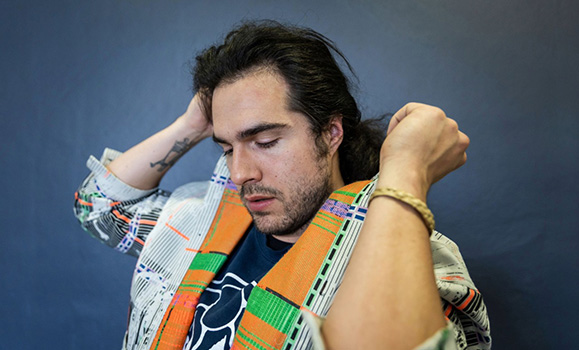Faculty of Arts and Social Sciences alum Jeremy Dutcher (BAâ13 in Music and Social Anthropology) has won the 2024 for his album, Motewolonuwok.
Dutcher is the first person to win the prestigious prize twice, first clinching it in 2018 for his debut album, Wolastoqiyik Lintuwakonawa.
An 11-member jury selected the record as the best Canadian album of 2024, based on artistic merit. Dutcher was chosen from a shortlist of 10 acclaimed finalists which included The Beaches, Allison Russell and Charlote Cardin. The winner was picked by a jury made up of journalists, broadcasters and bloggers from across Canada. The prize was awarded at Massey Hall in Toronto on Sept. 17.Â
"Six years ago, this award changed my life. I have to give unending gratitude to this music community, please keep your hands going for all of these nominees," Dutcher said . "To bring forward art and music in this land, in our languages, with our esthetics â all I have to say is we are shining for you, now go shine for other people."
Dutcher will return to Halifax on Oct. 25 and 26 to perform with Symphony Nova Scotia at the ±«Óătv Arts Centre. Itâs advertised as an all-new, boundary pushing orchestral performance and .
Dutcher is one of Dalâs notable alumni.

Jeremy Dutcher. (Cody Turner photo)
Winning an Aurum Award
In 2023, Dutcher also received a ±«Óătv Aurum Award in recognition of his amazing, impactful work, research, artistry and engagement, including his drive to preserve and carry forward a nearly extinct Indigenous language â Wolastoqey. Read an alumni spotlight story about Dutcher and watch a video about what winning an Aurum Award meant to him. âŻ
Dutcher is a Two Spirit, Wolastoqiyik member of the Tobique First Nation in New Brunswick. In 2013, while studying music at ±«Óătv, he chose to combine his studies with social anthropology.
âLearning how to play music is just one piece of the puzzle. The great part of social anthropology is the field work â the encouragement to get out there, to explore and ask questions,â he told ±«Óătv. âIt showed me that so much of what was being saidâŻaboutâŻmy cultureâs music, wasnât being saidâŻbyâŻmy culture. There needed to be a voice from within.â
Dutcher received $50,000 for his album Motewolonuwok, which he said he'll mostly donate to the Kehkimin Wolastoqey language immersion school in Fredericton founded by his mother, Lisa Perley-Dutcher.âŻ
Dutcherâs first record Wolastoqiyik Lintuwakonawa was sung entirely in Wolastoqey. His second album, Motewolonuwok, marks the first time he sings in both English and Wolastoqey.
âEven though I'm singing in English for the first time, still it's rooted within my vision, which is to see the proliferation and thriving of our languages, Indigenous languages here in Canada,â .
Dutcher said he hopes this record helps people consider that loss, joy, pain and celebration are all a part of life.

